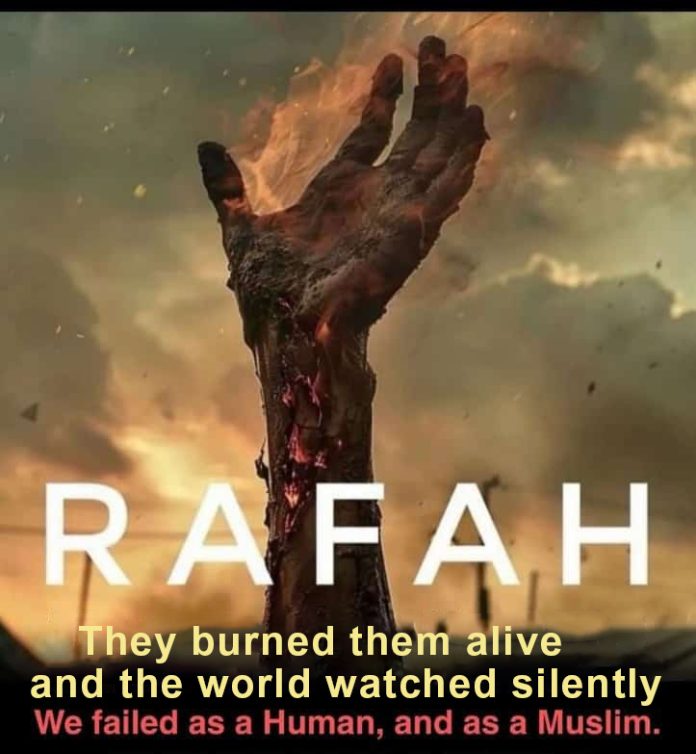All Eyes on Rafah as the World Reacts to Israeli Airstrike
30 May 2024: In the aftermath of Monday’s devastating Israeli airstrike on a displacement camp in Rafah, the horror and devastation continue to resonate deeply among survivors and observers alike. The attack, which killed at least 45 people, predominantly women and children, and left 249 wounded, has sparked outrage and condemnation worldwide.
On the face of Samir Abu Al-Sabh, 62, traces of shock still linger as he sits idly on a small chair in the middle of his burnt-down shed. Reflecting on the night of the strike, he describes a harrowing scene. “I was sitting in a makeshift shed made of tin, waiting for dinner when I heard the sound of two successive explosions,” Abu Al-Sabh recounted to The New Arab. “The place was immediately set ablaze, and the fire exceeded three metres high.”
Trapped and surrounded by flames, Abu Al-Sabh called for help until a relative managed to rescue him. Once outside, he witnessed people burning alive and corpses scattered across the camp. The fire spread rapidly, consuming the nylon and fabric tents that housed displaced families.
Gaza’s Health Ministry confirmed that 45 people perished in the strike, with the majority being women, children, and elderly individuals. Despite Israeli Prime Minister Benjamin Netanyahu describing the attack as a “tragic mishap” and claiming there was no intention to target civilians, survivors like Abu Al-Sabh refute these assertions. “The camp is visibly identified as a displacement camp, and there is nothing inside that could be harmful to Israel,” he insisted.
Abu Al-Sabh, a retired English teacher, had been displaced from Gaza’s central Bureij camp to Rafah. He described the camp as a place filled with civilian tents extending as far as the eye can see, with no presence of militant factions. Graphic videos of the aftermath, showing charred bodies and decapitated children, have fueled global condemnation and renewed calls for Israel to cease its military operations in Rafah.
Haseeb Ahmed, another survivor, challenged Israel’s claims that the camp harbored Hamas fighters. “The camp is open to the public and not covered. It is impossible to employ it geographically for aggression against Israel,” he stated.
Talal Salman, displaced from Beit Lahia, recounted his panic during the attack. “I was sitting in my tent when the deafening explosions came,” he said. Fleeing with his children to a nearby hill for safety, he expressed disbelief at the scale of the devastation. “This was no small bomb. It was a deliberate attack on our existence as human beings.”
The airstrike has exacerbated the humanitarian crisis in Gaza, with over a million people displaced and aid supplies dwindling. The international community, including the United States, has faced criticism for not doing enough to pressure Israel to halt its military operations. Meanwhile, solidarity with the people of Rafah has grown, with many countries calling for support and condemning Israel’s actions.
Samir Abu Al-Sabh holds a leaflet dropped by the Israeli army months ago, advising them to relocate to Rafah as a “safe zone.” Yet, as the camp lay in ruins, he reflects on the broken promise of safety. “In this safe zone, there were screams of people trapped inside, set on fire alive. We failed as humans when they were burnt alive.”
The world watches with a mix of horror and helplessness as the crisis in Rafah unfolds. The survivors’ testimonies serve as a stark reminder of the human cost of conflict and the urgent need for international intervention to protect civilian lives.




